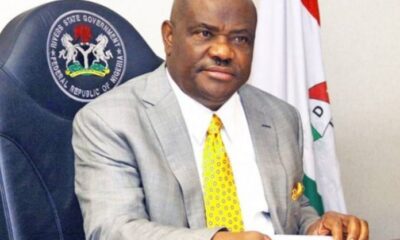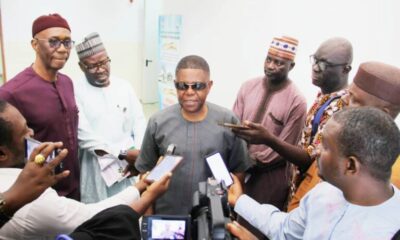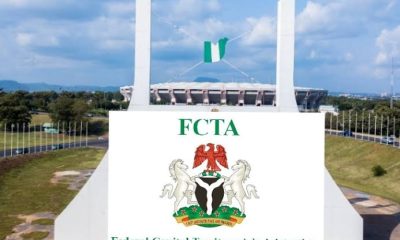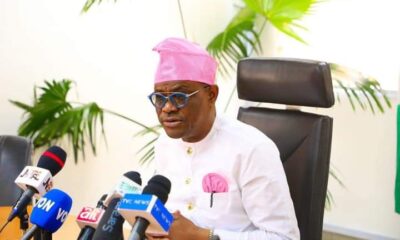Headline
FCTA, professionals meet over building collapse, undeveloped plots in Abuja

The Federal Capital Territory Administration (FCTA) on Wednesday met with building professionals, regulatory bodies and other stakeholders to address the problems of building collapse, undeveloped plots and abandoned structures.
Addressing journalists after the meeting in Abuja, the Director, Department of Development Control, FCTA, Mr Mukhtar Galadima, expressed FCTA’s concern over substandard structures and the spate of building collapse in the FCT.
Galadima explained that the meeting was to exchange views on how to stop the menace of building collapse in the FCT.
According to him, working with experts outside FCTA would help in strengthening supervision with a view to ensuring that only quality projects are delivered in the FCT.
“As a responsible agency, we have to be proactive in addressing the cases of building collapse. We have to work with professional bodies and regulating agencies.
“The meeting will help us to constitute a committee that will be making suggestions on tackling the menace of building collapse and substandard structures.
“We are going to engage with professionals and regulatory bodies continuously to discuss technical issues and strengthen supervision of building projects.
“This will help us to share responsibilities on how to ensure quality and safe buildings in the Abuja city,” he said.
Galadima disclosed that the committee which will soon be constituted will also examine issues surrounding abandoned structures and undeveloped plots and come up with solutions.
Also speaking, Mr Cyril Nwafor of the Council for the Regulation of Engineering in Nigeria (COREN), urged the National Assembly to implement the council’s recommendations submitted to it since 2010.
He listed the recommendations to include involvement of only registered professionals in handling projects and discipline of those behind failed projects.
Other professional bodies at the meeting included the Architect Registration Council of Nigeria (ARCON) and the Council of Registered Builders of Nigeria (CORBON) among others.
Headline
EFCC bars dollar transactions, orders embassies to charge in naira

The Economic and Financial Crimes Commission has barred foreign missions based in Nigeria from transacting in foreign currencies and mandated them to use Naira in their financial businesses.
The EFCC has also mandated Nigerian foreign missions domiciled abroad to accept Naira in their financial businesses.
The anti-graft agency said the move is to tackle the dollarisation of the Nigerian economy and the degradation of the naira
The Commission, therefore, asked the government to stop foreign missions in Nigeria from charging visa and other consular services in foreign denominations.
The EFCC gave the advisory in a letter to the Minister of Foreign Affairs, Amb. Yusuf Tuggar, for onward transmission to all foreign missions in the country.
In the letter, the EFCC said it issued the advisory because the practice of paying for consular services in dollars was in conflict with extant laws and financial regulations in Nigeria.
In a letter dated April 5, 2024, which was addressed to the Minister of Foreign Affairs, Ambassador Yusuf Tuggar, titled: “EFCC Advisory to Foreign Missions against Invoicing in US Dollar,” the EFCC Chairman, Ola Olukoyede expressed dismay over the invoicing of consular services in Nigeria by foreign missions in dollars.
The EFCC cited Section 20(1) of the Central Bank of Nigeria Act, 2007, which makes currencies issued by the apex bank the only legal tender in Nigeria.
The letter read, “I present to you the compliments of the Economic and Financial Crimes Commission, and wish to notify you about the commission’s observation, with dismay, regarding the unhealthy practice by some foreign missions to invoice consular services to Nigerians and other foreign nationals in the country in United States dollar ($).
“It states that ‘the currency notes issued by the Bank shall be the legal tender in Nigeria on their face value for the payment of any amount’.
“This presupposes that any transaction in currencies other than the naira anywhere in Nigeria contravenes the law and is, therefore, illegal.”
The commission further stated that the rejection of the naira for consular services in Nigeria by certain missions, along with non-compliance with foreign exchange regulations in determining service costs, is not just unlawful but also undermines the nation’s sovereignty embodied in its official currency.
The letter continues: “This trend can no longer be tolerated, especially in a volatile economic environment where the country’s macroeconomic policies are constantly under attack by all manner of state and non-state actors.
“In light of the above, you may wish to convey the commission’s displeasure to all missions in Nigeria and restate Nigeria’s desire for their operations not to conflict with extant laws and regulations in the country.”
Diplomatic sources said yesterday, May 10, that some embassies were wondering whether the EFCC’s advisory represented the position of the Federal Government.
Headline
Prince Harry visits sick Nigerian soldiers in Kaduna

Prince Harry and his team visited the 44 Nigerian Army Reference Hospital in Kaduna to interact with wounded soldiers who are receiving treatment.
The Duke of Sussex is in Nigeria with his wife to champion the Invictus Games, which Harry founded to aid the rehabilitation of wounded and sick servicemembers and veterans.
Nigeria joined the Invictus Community of Nations in 2022 becoming the first African country to join.
Prince Harry’s visit to Kaduna came 68 years after his late grandmother Queen Elizabeth II visited the state during the time of the late Premier of Northern Region Sir Ahmadu Bello.




-

 Headline6 days ago
Headline6 days agoPrince Harry visits sick Nigerian soldiers in Kaduna
-

 Entertainment6 days ago
Entertainment6 days agoAMVCA Cultural Day: BBNaija’s Neo, Venita win Best Dressed Male, Female
-

 Metro6 days ago
Metro6 days agoEx-Sports Minister laments after hospital neglected him for hours over N80000 deposit
-

 Headline6 days ago
Headline6 days agoEFCC bars dollar transactions, orders embassies to charge in naira














